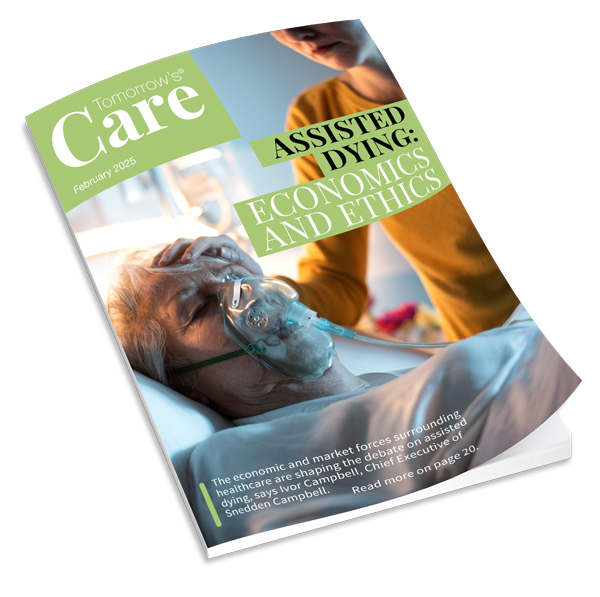Karolina Gerlich, CEO of The Care Workers’ Charity, highlights concerns around the impact of the compounding pressures faced by the social care workforce.
The social care sector is facing the biggest recruitment crisis in its history and unfortunately, this comes as no surprise to The Care Workers’ Charity. A series of catastrophic decisions and policies have meant we continue to face an uphill battle to retain those we have in the sector, let alone recruit desperately needed workers. There is no sign that this will improve anytime soon, if anything, things for our sector, our providers, our workforce and those who access social care provision look set to worsen considerably.
The Care Workers’ Charity role is sadly necessitated by low wages and sector-wide underfunding. Since 2009 we have been providing free financial grants to prevent eviction, pay energy bills, and help provide food, clothes and vital white goods. If our experience of supporting applicants in crisis can be used as a litmus test of how the sector and its workforce are faring, then it is very clear we that this is a test we are failing. The total value of all grants awarded by the Charity last year was £2.2m – an increase of 1,150% in grant giving activities compared to the previous year. We are inundated with requests for not only financial, but also wellbeing support as social care workers, traumatised and burnt-out from a combination of COVID-19, staff shortages and financial anxiety, seek our urgent assistance.
Yet, the crisis continues to deepen. Additional financial pressures are now compounding an already untenable situation for many social care workers who are now leaving the sector.
We remain incredibly disappointed that the English Government has refused to give social care workers any form of bonus, as was the case in other devolved nations, and that it continues to refuse to make any provisions for a pay rise that properly reflects and rewards care workers as skilled professionals.
The Government expectation that a pay rise for a care worker should only meet the standards for minimum living wage is wholly unacceptable. Social care workers, not to mention those who draw on social care, are surely far too important for this to be the case? Sadly, this is an argument which falls on deaf ears as the recognition shown to the social care sector and its workforce continues to be poor. This was demonstrated most recently by the Government visa exemptions put in place for HGV drivers but not for social care workers despite huge pressure from those in the sector.
To add insult to injury, social care workers remain labelled as 'low skill' on the immigration occupation list. This is not only hugely off-putting to potential future recruits, but also means that providers have lost a huge pool of talent previously accessed from outside the UK. Prior to the EUSS deadline, over 12% of our care workers came from the EU. This loss of capacity has been – and will continue to be – devastating for the sector.
The Government’s lack of ambition with regards to sector funding and wages, means that pay differentiation within social care continues to lessen and care workers with five or more years in the sector are paid just 12p more than new starters (Skills for Care, 2021). This, combined with a lack of value and recognition, means there is very little reward for staying or indeed, incentive for joining.
Furthermore, the legislation enforcing vaccinations has led to many leaving the sector, primarily into healthcare, which is not subject to the same rules. This move to enforce vaccinations on the social care sector has undoubtedly contributed to the staff shortages that are being experienced by providers, as many chose to leave before the rules came into force or were handed their notice by employers once it came into effect. The legislation left care staff feeling that their views and concerns were not being respected or heard, and has meant providers are left desperately trying to fill gaps in their rotas, with fewer and fewer people to fill them.
The Prime Minister’s recent statement on the ‘reform of social care’ gave very few answers to the concerns and challenges faced by the sector. The ‘reform’ will not only put very little money into the social care sector but in fact will result in already low paid, insecure social care workers being financially decimated. Analysis by Policy in Practice (September 2021) has found that the new Health and Social Care Levy will mean that care workers “earning the National Living Wage in April 2022 would pay an extra £121 a year, in effect paying for doing their job of caring for others”.
The Levy, in combination with the removal of the £20 uplift to Universal Credit, will devastate already fragile finances and living conditions and given that we must also consider that food and energy costs are expected to increase by £170 between now and April 2022, the Policy in Practice group estimate care workers will be worse off by £1035 a year. That’s not to include the rapidly increasing costs of petrol, which continues to be a source of huge anxiety for many care workers, reliant on their vehicles to get them to work, or as a central part of their role if they are providing homecare.
As expected, it is our workforce who are desperately suffering the catastrophic fall out from this compounding crisis. Pushed to beyond what is acceptable, financially insecure and continually devalued and forgotten, a recent RSA paper (Key Workers in the Pandemic, September 2021) showed care workers are finding it increasingly difficult to maintain their mental health, and expected to “feel burnout this winter” if they hadn’t already (49% have already experienced this). It is inevitable then, that with the ongoing challenges faced by those in social care roles, in combination with the trauma experienced during the pandemic, the attrition in the sector will only increase.
The latest ONS figures, from September 2021, show the number of job vacancies in the UK has risen to over 1 million for the first time since records began. To attract recruits in such a competitive labour market, sectors must have incentives, such as decent pay, reward, recognition, and respect but social care continues to come up empty. We have nothing left to give. We need change – and we it now.
























